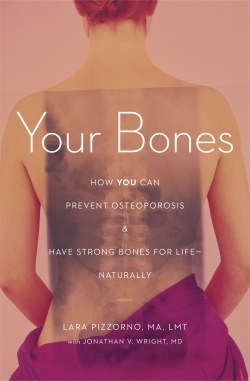Your Bones
How You Can Prevent Osteoporosis and Have Strong Bones for Life —Naturally
Like many medical people who advocate for natural health, Lara Pizzorno, managing editor for Longevity Medicine Review, and Dr. Jonathan Wright, biomedical researcher, carry the banner for vitamin/mineral supplements, exercise, and conscientious eating. They oppose what seems like “help” from large pharmaceutical companies whose products, they point out, are bound by laws requiring that, paradoxically, patented medicines are substances “never ever found in human bodies or anywhere else on planet earth.” Beware these toxins if you want to save your bones, is one of their book’s primary messages.
Fosomax and Boniva are two commonly prescribed meds for the prevention of osteoporosis. Yet such bisphosphonates have been proven to suppress the activity of osteoclasts, “the body’s specialized cells whose job it is to remove worn out, injured and otherwise damaged bone.” Resulting conditions include osteonecrosis of the jaw, atrial fibrillation, and increased risk of fractures. The FDA is aware of these risks and has issued warnings concerning the use of bisphosphonates, yet the TV ads persist and doctors prescribe these medicines every day.
Those who want to live longer by preventing bone loss, fractures, and possible death from a fall would do well to take the advice of Pizzorno and Wright, starting with the basics: take calcium and Vitamin D for your bones. Mother Nature packs calcium into foods that we love: tuna, salmon, beans, and eggs. A formula in Your Bones shows how to determine how much calcium each of us needs for our body size. Though vegetarianism is often recommended by naturopaths, the authors warn of neglecting protein, folates, riboflavin, and B6 intake, which naturally occur in meat, seafood, dairy products, and surprising sources like Brussels sprouts, lima beans, and asparagus.
Many people don’t realize that even second-hand cigarette smoke, along with alcohol and all the “bone busting” patent meds, can damage bone health. The authors delineate the kinds of tests needed to determine one’s level of bone loss (we all have some, after age forty). Surprisingly, a common element, strontium ranelate, has been shown to increase bone density and reduce fractures in women with osteopenia, a pre-osteoporosis condition, even in post-menopausal women. It’s necessary to take more calcium than strontium.
Your Bones provides valuable, detailed information on the best balance of exercise (short bursts of vigorous walking and weight-bearing workouts), targeted diet (organic, vegetarian, and low-fat), and supplements needed to guard against crippling or fatal bone loss.
Reviewed by
Barbara Bamberger Scott
Disclosure: This article is not an endorsement, but a review. The publisher of this book provided free copies of the book to have their book reviewed by a professional reviewer. No fee was paid by the publisher for this review. Foreword Reviews only recommends books that we love. Foreword Magazine, Inc. is disclosing this in accordance with the Federal Trade Commission’s 16 CFR, Part 255.

